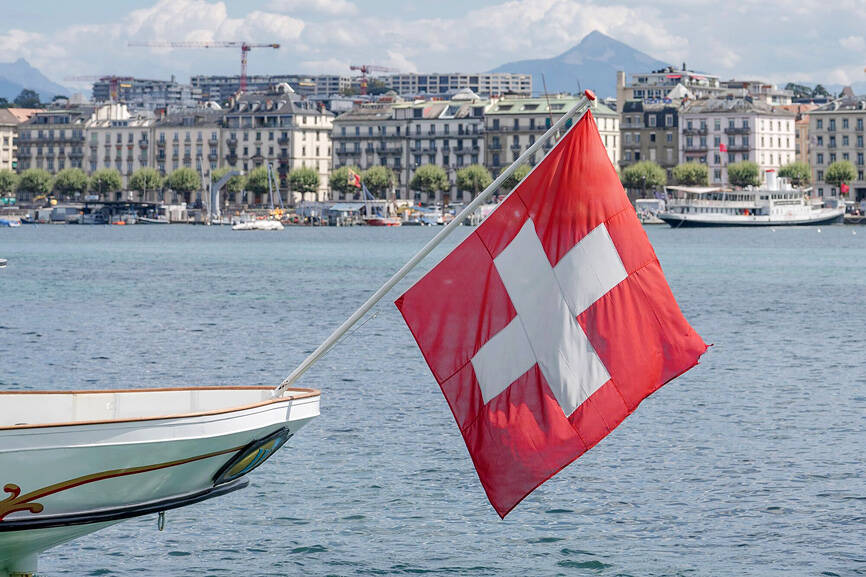QUID PRO QUO:
The US runs a US$38bn trade deficit with Switzerland, and the deal involving Swiss private sector-firms would eliminate it by 2028, the White House said
Switzerland on Friday announced plans to invest US$200 billion in the US through 2028 as it finalized a hard-wrought deal to slash US tariffs on Swiss goods.
Swiss Department of Economic Affairs, Education and Research head Guy Parmelin said US President Donald Trump’s administration has agreed to cut US tariffs on most Swiss goods to 15 percent — the same level imposed on the neighboring EU — from 39 percent, the highest rate on any Western country.
Speaking to reporters in Bern, Parmelin hailed the deal as a result of “new momentum generated by the commitment of the American president” and said it would take “several weeks” to take effect.

Photo: Bloomberg
The White House confirmed the deal on Friday, adding that companies from Switzerland and tiny Liechtenstein would invest US$67 billion of the US$200 billion in the US next year.
“These investments will create thousands of well-paying American jobs across all 50 states in a number of sectors, such as pharmaceuticals, machinery, medical devices, aerospace, construction, advanced manufacturing, gold manufacturing and energy infrastructure,” a White House fact sheet stated.
The US consistently runs a deficit — more than US$38 billion last year — in the trade of goods with Switzerland. The White House said “this deal with Switzerland will put us on a path to eliminate that deficit by 2028.”
Earlier, US Trade Representative Jamieson Greer on CNBC said that Switzerland would move manufacturing of some pharmaceuticals, gold smelting and railway equipment to the US.
Switzerland is already a top foreign investor in the US. The US$200 billion in Swiss investment would involve the private sector — what Parmelin called “Team Switzerland” cooperating with government.
Some Swiss goods, notably in the pharmaceuticals, chemicals, gold and semiconductor industries, had already been exempted from the 39 percent rate, which had threatened to put Swiss goods at a massive disadvantage to competitors from the EU and beyond.
The US would also suspend extra tariffs on other goods deemed “important” such as in aviation, but those on other sectors such as industrial machinery, watches, coffee and cheese would continue, Parmelin said, adding that Switzerland would continue to try to lower the tariffs on those.
Meanwhile, Trump on Friday announced that he was scrapping US tariffs on beef, coffee, tropical fruits and a broad swath of other commodities — a dramatic move that comes amid mounting pressure on his administration to better combat high consumer prices.
The US president’s abrupt retreat from his signature tariff policy on so many staples key to the American diet is significant, and it comes after voters in off-year elections this month cited economic concerns as their top issue, resulting in big wins for Democrats in Virginia, New Jersey and other key races around the country.
“We just did a little bit of a rollback on some foods like coffee,” Trump said aboard Air Force One as he flew to Florida hours after the tariff announcement was made.
Pressed on his tariffs helping to increase consumer prices, Trump said: “I say they may, in some cases” have that effect.
“But to a large extent they’ve been borne by other countries,” he added.